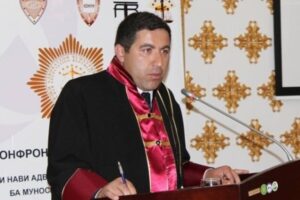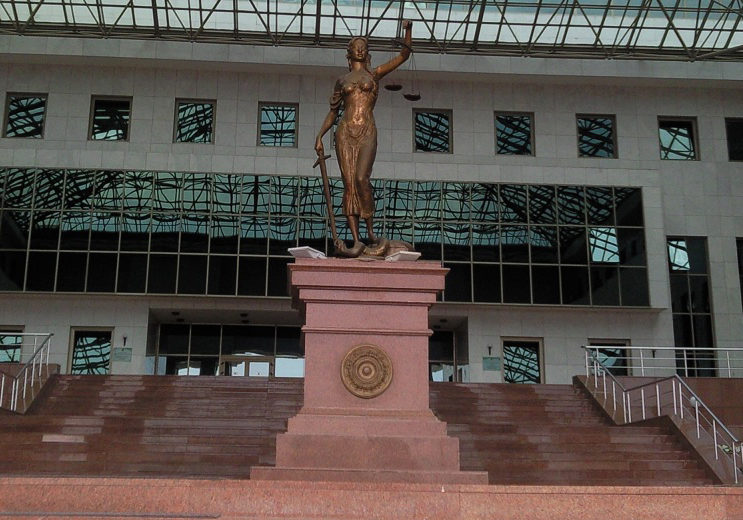
Jul 11, 2018 | Новости, Статьи
Сегодня МКЮ выразила озабоченность принятием нового закона об адвокатах в Казахстане.
Закон «Об адвокатской деятельности и юридической помощи», подписанный 10 июля 2018 года, противоречит международному праву и стандартам, касающихся независимости юридической профессии, позволяя исполнительным органам власти оказывать влияние или контролировать адвокатов через допуск к адвокатской профессии, а также существенно влиять на дисциплинарное производство в отношении адвокатов.
Закон негативно отразится на защите прав человека и верховенстве права в Республике Казахстан.
«Некоторые ключевые положения принятого закона подрывают независимость юридической профессии, которая является краеугольным камнем верховенства права», сказал сегодня Тимур Шакиров, старший правовой советник Европейской программы МКЮ.
«Закон не только ослабляет юридическую профессию, но и, к сожалению, посылает сигнал обществу о том, что в результате, права человека, включая право на справедливое судебное разбирательство, будет сложнее защитить в рамках правовой системы», добавил г-н Шакиров.
МКЮ особенно озабочена тем, что согласно новому закону, сокращена роль независимой адвокатуры в формировании состава дисциплинарных комиссий.
Кроме непосредственно адвокатов, дисциплинарные комиссии будут включать в свой состав «представителей общественности», предлагаемых Министерством Юстиции.
В то время как закон не устанавливает, как именно будут отбираться эти члены дисциплинарных комиссий, отбор будет производиться Министерством Юстиции.
Не исключено, что так же будут выбираться члены комиссий из числа судей в отставке, которые, согласно закону, тоже должны входить в состав дисциплинарных комиссий.
Хотя многие из предусмотренных процедур неясны, очевидно, что эти положения дают Министерству Юстиции значительное влияние на дисциплинарные комиссии, учитывая, что закон явно не требует от этих членов исполнять их обязанности независимо от указаний Министерства Юстиции.
Влияние исполнительных органов власти на дисциплинарные процедуры адвокатуры противоречит принципам независимости адвокатов.
Основные принципы ООН, касающиеся роли юристов, предусматривают, что дисциплинарные меры в отношении юристов должны рассматриваться беспристрастным дисциплинарным комитетом, создаваемым юристами, в независимом органе, предусмотренном законом, или в суде и подлежат независимому судебному контролю.
Более того, закон продолжает наделять Министерство Юстиции полномочиями по контролю над доступом к профессии.
Закон требует от будущего адвоката, по завершении профессионального обучения, пройти процедуру аттестации, в комиссиях, создаваемых территориальными органами юстиции.
Эти комиссии состоят из семи членов, из которых только трое являются представителями адвокатуры. Состав комиссии и правила их работы утверждаются Министерством Юстиции Республики Казахстан.
Таким образом, закон сохраняет прежнюю процедуру по допуску к профессии, которая ранее уже подвергалась критике со стороны МКЮ и согласно которой, аттестация и выдача адвокатских лицензий находятся в исключительной компетенции Министерства Юстиции Республики Казахстан.
В то же время, многие права защитников в законе ограничены или могут быть подорваны формулировками, которые указывают на необходимость дальнейшего регламентирования таких прав на уровне подзаконных актов, включая то, что принятый закон не позволит адвокатам свободно и без вмешательства собирать доказательства в защиту своих клиентов или то, что адвокатские запросы могут игнорироваться на основе того, что запрашиваемая информация имеет «ограниченный доступ».
МКЮ отмечает, что Основные принципы ООН, касающиеся роли юристов предусматривают, что «компетентные органы обязаны обеспечивать юристам достаточно заблаговременный доступ к надлежащей информации, досье и документам, находящимся в их распоряжении или под их контролем, с тем чтобы юристы имели возможность оказывать эффективную юридическую помощь своим клиентам. Такой доступ должен обеспечиваться, как только в этом появляется необходимость» (Принцип 21).
Прочитать весь текст вы можете здесь
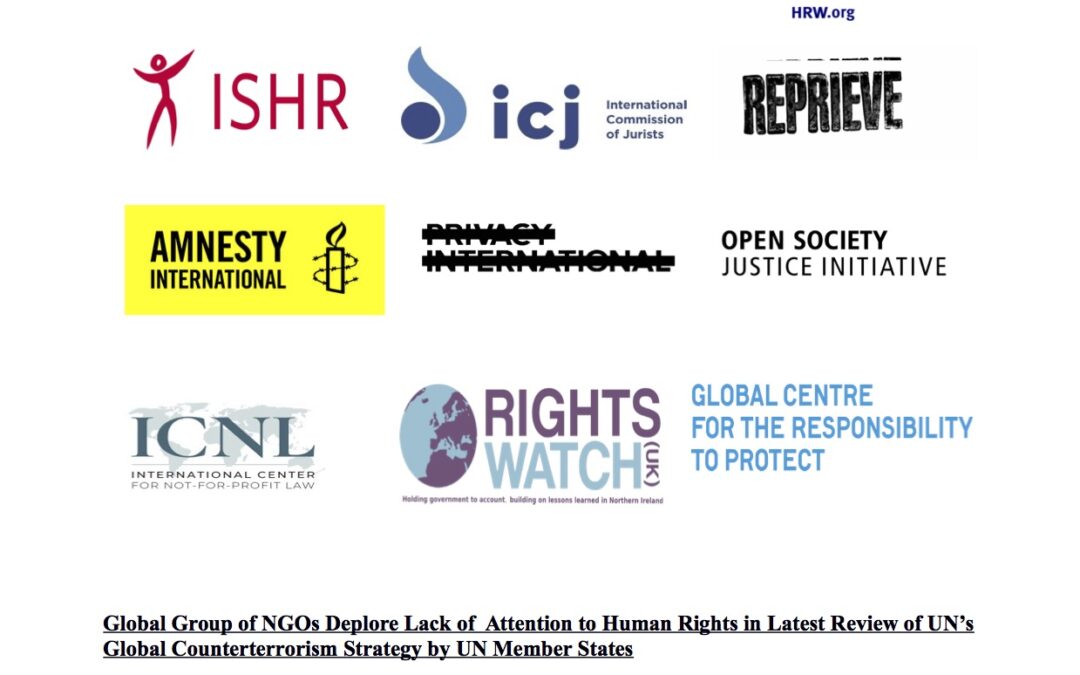
Jul 11, 2018 | Адвокаси, Неюридические заявления
Сегодня МКЮ присоединилась к другим организациям гражданского общества, призывая к тому, чтобы уважение прав человека, защита гражданского общества и участие в нем, играли более активную роль в Глобальной контртеррористической стратегии ООН.
Совместное заявление организаций последовало за принятием Генеральной Ассамблеей ООН 26 июня 2018 года резолюции 72/284, посвященной рассмотрению Глобальной контртеррористической стратегии Организации Объединенных Наций. Глобальная контртеррористическая стратегия ООН, впервые принятая в 2006 году, содержит план действий для ООН и государств-членов на глобальном, региональном и национальном уровнях для борьбы с терроризмом.
Организации подчеркивают ценность глобальной контртеррористической стратегии, в которой права человека являются важным компонентом. Они отмечают, что резолюция Генеральной Ассамблеи в значительной степени подтверждает обязательства государств соблюдать международное право, в том числе международные права человека в условиях борьбы с терроризмом, и что права человека являются «существенной основой борьбы с терроризмом».
В совместном заявлении выражается обеспокоенность в связи с тем, что государства не смогли адекватно устранить нарушения прав человека в отношении мер по борьбе с терроризмом. В нем также выражается обеспокоенность по поводу того, что государства не предоставили благоприятные условия для организаций гражданского общества, в том числе тех, которые касаются женщин, для значительного участия в обзоре Стратегии.
Полное заявление и список присоединяющихся к нему организаций можно скачать на английском в формате PDF здесь: UN-Advocacy-JointStatement-CounterTerrorismStrategy-2018
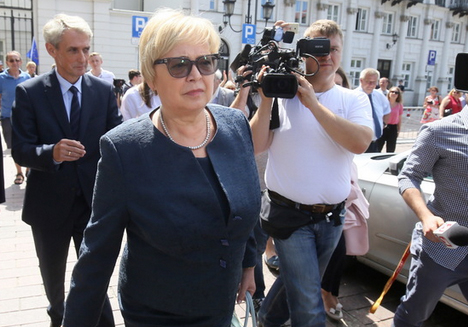
Jul 11, 2018 | Advocacy, News, Open letters
Twenty-two senior judges from across the globe wrote today to Polish President Andrzej Duda to condemn the recent attacks on the independence of the judiciary.
The judges, all Commissioners or Honorary Members of the International Commission of Jurists, criticized the forced resignation of 27 of 72 judges of Poland’s Supreme Court as a severe blow to the independence of the Polish judiciary in violation of international standards.
The letter was organized by the ICJ and its Centre for the Independence of Judges and Lawyers in consultation with jurists from 17 countries.
“The Polish government’s assault on the country’s judiciary is a major blow to the rule of law in Poland,” said Sam Zarifi, ICJ Secretary General.
He added:
“The situation in Poland is of concern to judges in the country, as well as in the European Union and around the world.”
“The ICJ and jurists everywhere will speak out against this surge of attacks on the judiciary that is increasingly a pattern in many countries, including several that until recently were at least rhetorically champions of the rule of law.”
“This letter shows that the commitment to the rule of law and judicial independence is not limited to just one part of the world or one legal system, but rather reflects the views of the global community of jurists.”
In their letter, the ICJ senior judges “condemn the recent forced retirement of 27 out of 72 Polish Supreme Court justices, including its President Małgorzata Gersdorf (photo), and urge President Duda to act immediately to restore the independence of the judiciary by reinstating them in office.”
They express grave concern “that the effective dismissal of one third of the Supreme Court, coupled with the broad discretion given to the President’s office to make exceptions, has taken place in contravention of international human rights law and standards, including the right to a fair hearing, and is contrary to basic principles of the rule of law.”
Finally, the “undersigned jurists urge the President of the Republic of Poland to act immediately to restore the independence of the judiciary by reinstating the Supreme Court justices forced into retirement, follow the recommendations of the European Commission on judicial reform, and take action to repeal the law on the Supreme Court that strikes at the very core of judicial independence.”
The signatories
- Justice Adolfo Azcuna, former Associate Justice of the Supreme Court of the Philippines
- Justice Solomy Balungi Bossa, Ugandan Judge on the International Criminal Court
- Justice Ian Binnie, retired Justice of the Supreme Court of Canada
- Justice Azhar Cachalia, Judge of the Supreme Court of Appeal of South Africa
- Dame Silvia Cartwright, former Judge of the High Court in New Zealand and of the Extraordinary Chambers in the Courts of Cambodia
- Justice Moses Chinhengo, Judge of the High Court of Botswana
- Justice Martine Comte, former President of the Orleans Court of Appeal, France
- Justice Radmila Dracigevic-Dicic, Acting President of the Supreme Court of Appeals, Judge of the Supreme Court of Serbia
- Justice Elizabeth Evatt, former Chief Justice of the Family Court of Australia
- Justice Claire L’Heureux-Dubé, former Justice of the Supreme Court of Canada
- Justice Paul J. G. Kapteyn, former Judge of the European Court of Justice
- Justice Michael Kirby, former Justice of the High Court of Australia and former President of the International Commission of Jurists
- Justice Kalthoum Kennou, Judge of the Tunisian Cassation Court
- Justice Ketil Lund, former Justice of the Norwegian Supreme Court
- Justice Qinisile Mabuza, Judge of the High Court of Swaziland
- Justice Egbert Myjer, former Judge of the European Court of Human Rights
- Justice Michèle Rivet, former President of the Quebec Human Rights Tribunal
- Justice Kalyan Shrestha, former Chief Justice of the Nepalese Supreme Court
- Justice Philippe Texier, Judge of the French Court of Cassation
- Justice Lillian Tibatemwa-Ekirikubinza, Justice of the Supreme Court of Uganda
- Justice Stefan Trechsel, former ad litem Judge at the International Criminal Tribunal for the former Yugoslavia
- Dr Rodrigo Uprimny Yepes, former Assistant Justice of the Constitutional Court of Colombia
Poland-Reinstate forcibly retired judges-Advocacy-Open letters-2018-ENG (full text of letter in PDF)
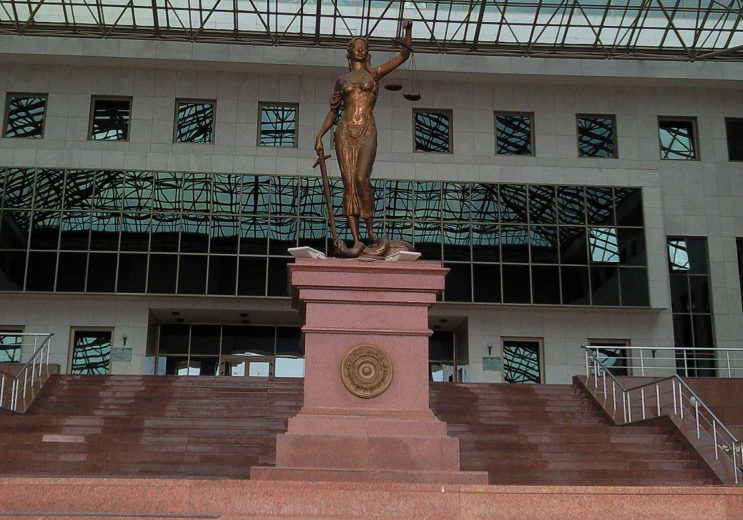
Jul 11, 2018 | News
Today, the ICJ expressed concern at the adoption of a new law on lawyers in Kazakhstan.
The Law ‘On the Professional Activities of Advocates and Legal Assistance’, signed into law on 10 July 2018, contradicts international law and standards on the independence of the legal profession, by enabling the executive to influence or to have control over who is allowed to practice law and substantial influence on disciplinary proceedings against lawyers.
The law will have negative repercussions for protection of human rights and the rule of law in the Republic of Kazakhstan.
“Some of the key provisions of the adopted law undermine the independence of the legal profession, a cornerstone of the rule of law,” Temur Shakirov, ICJ Europe Program Senior Legal Adviser said today.
“Not only does the law weaken the legal profession, it sends an unfortunate message to the public that, as a result, their human rights, including their right to a fair trial, may be harder to uphold within the legal system,” he added.
More specifically, the ICJ is concerned that, under the new law, the role of the independent Bar Association in the composition of the disciplinary commissions is reduced.
Besides lawyers, the Disciplinary Commission will now include ‘representatives of the public’ designated by the Ministry of Justice. While the law does not specify how these members of the Disciplinary Commission would be selected, the selection is to be made by the Ministry of Justice.
The same procedure is not excluded to select members who are retired judges, which the Law requires also be part of disciplinary commissions.
While many of the specific procedures are unclear, it is apparent that these provisions would give the Ministry extensive influence over the Disciplinary Commission, especially as the law does not explicitly require these members perform their duties independently from the instructions of the Ministry of Justice.
The influence of the executive over the disciplinary proceedings of the Bar Association is contrary to the principles of independence of lawyers.
The UN Basic Principles on the Role of Lawyers provide that disciplinary proceedings against lawyers are to be brought before an impartial disciplinary committee established by the legal profession, before an independent statutory authority, or before a court, and shall be subject to an independent judicial review.
Furthermore, the law continues to give the Ministry of Justice control over admission to the practice of law.
It stipulates that prospective lawyers who have completed their professional training are to be assessed by the Commission for admission to practice established by territorial bodies of the Ministry of Justice.
The commissions consist of seven members, of which only three are members of the Bar Association. The composition of the commissions and the principles of their work are to be approved by the orders of the Minister of Justice of the Republic of Kazakhstan.
The Law therefore preserves the previous procedure on admission to the profession criticized by the ICJ earlier, according to which the attestation of applicants for obtaining the membership to the Bar Association and issuing a license were within the exclusive competence of the Ministry of Justice of the Republic of Kazakhstan.
At the same time, many defense rights listed in the Law are curtailed or compromised by the wording that would allow for enactment of restrictions by secondary legislation, including that the adopted Law would not allow lawyers to freely and without interference collect evidence in defense of their clients or that lawyer’s inquiries can be subject to limitation where they seek to obtain “restricted information”.
The ICJ notes that according to the UN Basic Principles on the Role of Lawyers, States must ensure lawyers have access to appropriate information, files and documents in their possession or control in sufficient time to enable lawyers to provide effective legal assistance to their clients. Such access should be provided at the earliest appropriate time (Principle 21).
Read the full text in English here
Read the full text in Russian here
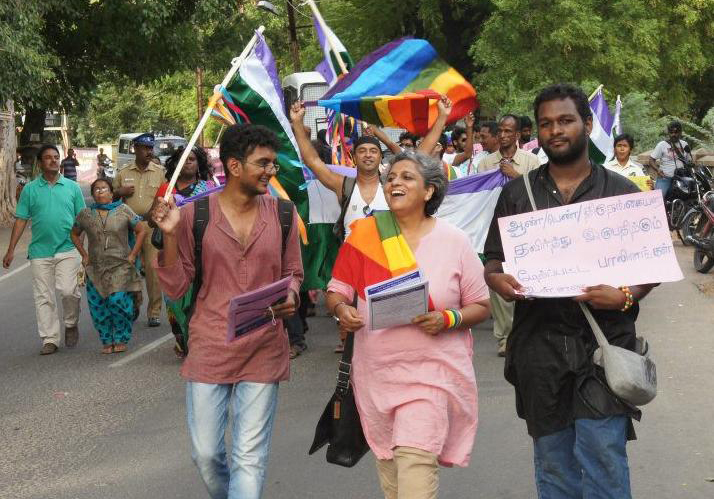
Jul 10, 2018 | News
The SC is set to reconsider the criminalization of consensual same-sex relationships between adults, in response to a writ petition with significant ramifications for addressing the full range of human rights violations based on sexual orientation or gender identity in India said the ICJ.
The Indian Supreme Court commenced hearing the case, Navtej Singh Johar v. Union of India, which is joined with five connected cases, today, concerning the constitutional validity of the criminalization of consensual same-sex relations between adults under Section 377 of the Indian Penal Code in response to writ petitions filed by several LGBTI individuals.
Section 377 criminalizes “carnal intercourse against the order of nature”. Section 377 is a relic of the British colonial penal code and is replicated in several former British colonies even though it was it was finally repealed in Northern Ireland in 1982, following repeals in Scotland in 1980 and England and Wales in 1967.
“Hopefully, the Indian Supreme Court will follow and build upon the strong precedent set by the Delhi High Court in the Naz Foundation v. Govt. of NCT of Delhi that declared Section 377 and the criminalization of consensual same-sex relationships to be in violation of the Indian Constitution as well as international law in 2009,” said Sam Zarifi, ICJ’s Secretary General.
“There are real grounds for optimism as the Indian Supreme court as recently as August 2017 handed a landmark judgment in Justice K.S. Puttaswamy and Another v. Union of India and Others that declared the right to determine one’s sexual orientation and gender identity as core to the right of privacy,” he added
The ICJ has documented how section 377 has created a climate in which arbitrary arrest, extortion, harassment and blackmail of LGBTI persons in India thrives.
“The Indian judiciary’s decision to read down section 377 in Naz Foundation v. Govt. of NCT of Delhi, which was then overruled by the Supreme Court, has been used by several other jurisdictions, such as Trinidad and Tobago as support for putting an end to criminalization of same-sex relationships. So the outcome of this petition before the Indian Supreme Court is of significance not just to people in India, but to the fight against discrimination around the world,” Zarifi said.
“But even a good decision by the Indian Supreme Court will not end the discrimination against people on the basis of their sexual orientation or gender identity in India. It’s time for the Indian Parliament to repeal section 377 in its entirety and engage in a wide-ranging review to consider which gaps, if any, need to be filled, for example with respect to acts constituting rape or other sexual offences,” he added.
Contact:
Maitreyi Gupta (Delhi), International Legal Adviser for India, t: +91 7756028369 ; e: maitreyi.gupta(a)icj.org
India-Supreme Court and Section377-News-press release-2018-ENG (full story with additional information, in PDF)







